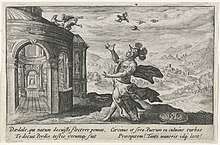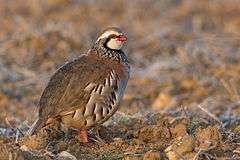Perdix (mythology)
Perdix (Ancient Greek: Πέρδιξ means "partridge"[1]) was a nephew and student of Daedalus in Greek mythology. In other sources, Perdix is the parent of Talos or Attalus.[2]


Mythology
Daedalus was so proud of his achievements that he could not bear the idea of a rival. His sister, sometimes named as Perdix, had placed her son (variously named Perdix, Talos, or Calos) under his charge to be taught the mechanical arts. He was an apt scholar and showed striking evidence of ingenuity. While walking on the seashore, he picked up the spine of a fish or a serpent's jaw. Imitating it, he took a piece of iron and notched it on the edge, thus inventing the saw. He made a pair of compasses by putting two pieces of iron together, connecting them at one end with a rivet, and sharpening the other ends.
Daedalus was so envious of his nephew's accomplishments that he took an opportunity, when they were together one day on the top of a high tower, to push him off. But Athena, who favors ingenuity, saw him falling and arrested his fate by changing him into a bird called after his name, the perdix (partridge). This bird does not build its nest in the trees, nor take lofty flights, but nestles in the hedges, and mindful of his fall, avoids high places. For this crime, Daedalus was tried and banished.[3] In some accounts, Athena leaves Daedalus with a scar in the shape of a partridge, to remind him of what he did.
Perdix is mentioned in book VIII of Ovid's Metamorphoses. According to Ovid, Perdix was the mother of Deadalus' nephew and not the nephew himself.
References
- Graves, Robert (1960). The Greek Myths. Harmondsworth, London, England: Penguin Books. pp. 12. ISBN 978-0143106715.
- John Tzetzes. Chiliades, 1.19 line 493
- Bulfinch, Thomas (2014). Bulfinch's Mythology. Penguin Group. p. 130. ISBN 978-0-399-16922-9.
- Smith, William; Dictionary of Greek and Roman Biography and Mythology, London (1873). "Perdix"